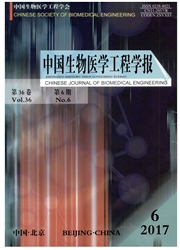

 中文摘要:
中文摘要:
Gabexate mesilate(GM) is a trypsin inhibitor,and mainly used for treatment of various acute pancreatitis,including traumatic pancreatitis(TP),edematous pancreatitis,and acute necrotizing pancreatitis. However,due to the characteristics of pharmacokinetics,the clinical application of GM still needs frequently intravenous administration to keep the blood drug concentration,which is difficult to manage. Specially,when the blood supply of pancreas is directly damaged,intravenous administration is difficult to exert the optimum therapy effect. To address it,a novel thermosensitive in-situ gel of gabexate mesilate(GMTI) was developed,and the optimum formulation of GMTI containing 20.6%(w/w) P-407 and 5.79%(w/w) P188 with different concentrations of GM was used as a gelling solvent. The effective drug concentration on trypsin inhibition was examined after treatment with different concentrations of GMTI in vitro,and GM served as a positive control. The security of GMTI was evaluated by hematoxylin-eosin(HE) staining,and its curative effect on grade Ⅱ pancreas injury was also evaluated by testing amylase(AMS),C-reactive protein(CRP) and trypsinogen activation peptide(TAP),and pathological analysis of the pancreas. The trypsin activity was slightly inhibited at 1.0 and 5.0 mg/m L in GM group and GMTI group,respectively(P<0.05 vs. P-407),and completely inhibited at 10.0 and 20.0 mg/m L(P<0.01 vs. P-407). After local injection of 10 mg/m L GMTI to rat leg muscular tissue,muscle fiber texture was normal,and there were no obvious red blood cells and infiltration of inflammatory cells. Furthermore,the expression of AMS,CRP and TAP was significantly increased in TP group as compared with control group(P<0.01),and significantly decreased in GM group as compared with TP group(P<0.01),and also slightly inhibited after 1.0 and 5.0 mg/m L GMTI treatment as compared with TP group(P<0.05),and significantly inhibited after 10.0 and 20.0 mg/m L GMTI treatment as compared with TP group(P<0.01). HE staining results demonstrated that panc
 英文摘要:
英文摘要:
Gabexate mesilate(GM) is a trypsin inhibitor,and mainly used for treatment of various acute pancreatitis,including traumatic pancreatitis(TP),edematous pancreatitis,and acute necrotizing pancreatitis. However,due to the characteristics of pharmacokinetics,the clinical application of GM still needs frequently intravenous administration to keep the blood drug concentration,which is difficult to manage. Specially,when the blood supply of pancreas is directly damaged,intravenous administration is difficult to exert the optimum therapy effect. To address it,a novel thermosensitive in-situ gel of gabexate mesilate(GMTI) was developed,and the optimum formulation of GMTI containing 20.6%(w/w) P-407 and 5.79%(w/w) P188 with different concentrations of GM was used as a gelling solvent. The effective drug concentration on trypsin inhibition was examined after treatment with different concentrations of GMTI in vitro,and GM served as a positive control. The security of GMTI was evaluated by hematoxylin-eosin(HE) staining,and its curative effect on grade Ⅱ pancreas injury was also evaluated by testing amylase(AMS),C-reactive protein(CRP) and trypsinogen activation peptide(TAP),and pathological analysis of the pancreas. The trypsin activity was slightly inhibited at 1.0 and 5.0 mg/m L in GM group and GMTI group,respectively(P〈0.05 vs. P-407),and completely inhibited at 10.0 and 20.0 mg/m L(P〈0.01 vs. P-407). After local injection of 10 mg/m L GMTI to rat leg muscular tissue,muscle fiber texture was normal,and there were no obvious red blood cells and infiltration of inflammatory cells. Furthermore,the expression of AMS,CRP and TAP was significantly increased in TP group as compared with control group(P〈0.01),and significantly decreased in GM group as compared with TP group(P〈0.01),and also slightly inhibited after 1.0 and 5.0 mg/m L GMTI treatment as compared with TP group(P〈0.05),and significantly inhibited after 10.0 and 20.0 mg/m L GMTI treatment as compared
 同期刊论文项目
同期刊论文项目
 同项目期刊论文
同项目期刊论文
 期刊信息
期刊信息
